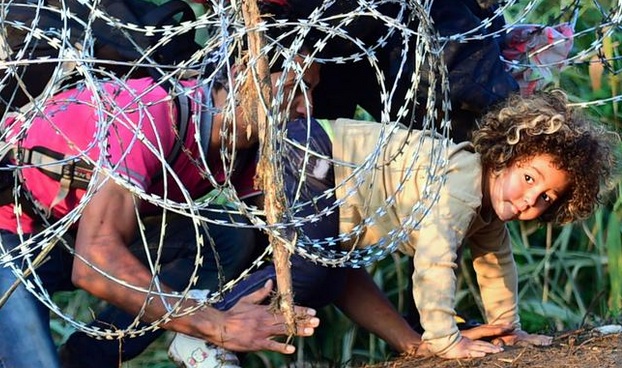
Europe on trial
‘I was hungry, and you threw food at me like I was an animal in the zoo. I was a stranger and you erected a 175-kilometer razor-wire barrier to keep me out. I was thirsty, sick and needed fresh clothes and you threatened me with three years in prison if I crossed the border illegally, and five years if I damaged the fence.’
‘But Lord, when did we see you hungry or thirsty or a stranger or needing clothes or sick or in prison, and did not help you? You don’t mean those Muslims, surely?’
‘Truly I tell you, whatever you did not do for one of the least of these, you did not do for me.’
Then they will go away to eternal punishment, but the righteous to eternal life.
Strong words, but they are based on Jesus’ unambiguous statements in Matthew 25 and have total relevance for us in Europe today.
The irony is that some of our leaders, like Hungarian Prime Minister Viktor Orban, justify a hard-line approach against asylum-seekers as necessary to preserve Europe as a ‘Christian’ continent.
Others, led by Angela Merkel, argue that Europe’s core Christian identity will only be preserved by acts of Christian compassion, not by exclusion, confrontation and rejection.
In support of Merkel, Britain’s centre-left daily, The Guardian, editorialised: The moral imagination of the Hebrew scriptures was determined by a battered refugee people, fleeing political oppression in north Africa, and seeking a new life for themselves safe from violence and poverty. Time and again, the books of the Hebrew scriptures remind its readers not to forget that they too were once in this situation and their ethics must be structured around practical help driven by fellow-feeling.
Collaboration
Archbishop Justin Welby told David Cameron that the PM’s proposed quota of 20,000 refugees ‘is still a very slim response in comparison to the figures given by the UNHCR and the European Commission; and that it is likely that it is going to have to rise over the next five years.’ A problem of this scale could only morally and credibly be dealt with by widespread European collaboration, he told the House of Lords.
Pope Francis has also been outspoken in his support for migrants, saying the ‘gospel calls us to be close to the smallest and to the abandoned’. ‘May every parish, every religious community, every monastery, every sanctuary of Europe, take in one family,’ he said.
Yes, the crisis is far too important to leave to politicians or even to church leaders. We Europeans, whatever our place in society, can play a role, even if it is only to tell our politicians what we expect of them.
‘Meet & Eat’
Here in The Netherlands, in our neighbouring city of Apeldoorn, Christians mobilised this weekend to welcome hundreds of Syrians and Ethiopians into their homes for meals, and to provide ongoing friendship and support. The ‘meet and eat’ campaign is planned to spread to other centres in the Netherlands and was reported on national radio as a great success.
The refugee crisis is one of several facing Europe that will not quickly go away. Crisis has become the new norm. How we as believers respond to this challenge will influence the credibility of both the church and the gospel–as in the early centuries of the church when believers reached out sacrificially to those who were not of their own group.
Neither should we forget that all the media attention on the refugees flooding into Europe focuses on merely the tip of the iceberg, as Archbishop Welby points out. Check out Professor Hans Rosling’s delightfully simple videos explaining complex global issues in plain language. His talk on Syria’s refugees explains that, before the conflict, Syria was home to 20 million people. Of these, 8 million currently remain ‘internally displaced’ in Syria, while a further 4 million are living in the neighbouring countries of Turkey, Lebanon and Jordan. To date, 250,000 Syrian migrants have applied for asylum within the EU, a figure which represents less than 2% of the total number of refugees displaced from their homes.
Idealism
Some however see the opening of the borders, nations and homes as misguided idealism. To my great dismay and embarrassment, I have seen posts on Facebook this week from Christian friends and colleagues arguing that rather than accept the refugees, we should pour more money, soldiers and weapons into the fight against ISIS. We need to fix their homes in their homelands rather than give them homes in ours. Well, our western efforts to ‘fix their homes’ show little sign of success. Meanwhile what do we do with the refugees?
As Merkel has asked, will we Europeans live up to our own self-professed European values? Or do we only believe in human rights for (non-Muslim) Europeans?
Whether we find ourselves among the sheep or the goats Jesus talks about in Matthew 25 may depend on our response to the current crisis.
Till next week,
Jeff Fountain

Excellent Jeff!
Germany sure did surprise everyone yesterday?!
Amen to that!
As an Australian I can only wonder at my own government’s mean-hearted attempts to restrict refugee entry by both sides of politics. Christians should realise that this is so not a political issue